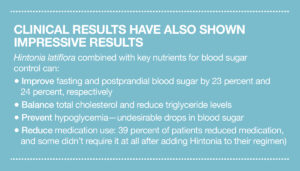PREVENT OR REVERSE TYPE 2 DIABETES WITH HINTONIA LATIFLORA
While many of your patients may come to you for reasons related directly to physical health conditions – pulled muscles, slipped discs, hips out of alignment – they may also struggle with high blood sugar or type 2 diabetes.
It is reported that about 86 million Americans have pre-diabetes (high blood sugar but not quite full-blown diabetes) and 90 percent may not realize it. That’s in addition to the almost 30 million Americans who have type 2 diabetes, of which 25 percent have not been diagnosed with the condition and are likely not taking measures to address it.
The Sugar and Insulin Connection
Certain types of sugars, at proper levels, have a place in the diet and the normal functioning of the body. Insulin, a hormone created in the pancreas, picks up sugar in the bloodstream and carries it into the cells to use for energy. But that process only runs smoothly up to a point.
The more starch and sugar a person consumes, the more insulin their body needs to produce. High-sugar and high-carbohydrate diets put a huge burden on insulin production. There is simply too much sugar for insulin to process, and increasingly higher levels of sugar remain in the bloodstream.
There’s another complication. Because high-sugar and refined carbohydrate foods cause inflammation, the body’s natural inflammatory reaction can impair the ability of insulin to do its job, so cells become starved for energy. If cells start to ignore insulin(insulin resistance), they do not respond to insulin’s signals to accept sugar into the cell for energy production. Starved too long, cells start to die. It seems ironic – and tragic – that a disease often associated with gaining extra weight actually causes starvation at a cellular level.

But high blood sugar and diabetes is not inevitable. Despite the statistics, your patients can stabilize and reverse their high blood sugar levels with diet, exercise, and an extract from an herb called Hintonia latiflora.
Hintonia latiflora—Herbal Rescue for High Blood Sugar
The dried bark of Hintonia latiflora has been traditionally used to support healthy blood sugar levels, and, in fact, it is commonly found in marketplaces in Mexico. It grows in the desert, where it has to withstand an intense climate. Toughing out monsoon-like rainy seasons and scorching dry spells has created a powerful defense mechanism within the plant itself. Much in the same way that concentrations of anthocyanins (protective compounds found in berries) increase after a plant is stressed, the beneficial features of Hintonia are made all the stronger by its ability to survive and thrive in a difficult environment. While Hintonia has been traditionally recommended for type 2 diabetes and gastrointestinal complaints, it has shown some exciting clinical results as well.
In fact, it is so well regarded that Hintonia extract has been clinically studied in Europe for over 70 years and approved for use in people with type 2 diabetes. Early research showed impressive results: Hintonia latiflora could help people avoid the need to go on medication or reduce medication in individuals unable to control their blood sugar by diet alone. More recent studies continued to verify its use.
Impressive Results Seen in Clinical Studies
In a 2014 study published in the German journal Naturheilpraxis mit Naturalmedizin (Naturopathic Practice with Natural Medicine), the same dry concentrated bark extract of Hintonia latiflora – combined with additional nutrients (vitamins B1, B6, B12, folic acid, chromium, zinc, and vitamins C and E) – significantly lowered A1C values, fasting glucose levels and postprandial blood sugar levels in patients who were already receiving diet counseling and medical treatment (often oral and/or injectable anti-diabetes drugs). Factoring all of the symptoms associated with type 2 diabetes, the scores improved from 4.8 points to 1.3 points at the end of the study. Participants also saw improvements in blood pressure, lipids, and liver values–beyond that of the treatment they were already using.
In this study, after eight months, A1C levels improved by an average of 10.4 percent, again, beyond the lowering achieved with other medical interventions – a potentially life-saving difference. (Fasting glucose was lowered by an average of 23.3 percent, and postprandial glucose by an average of 24.9 percent.)

Best of all, the herbal intervention was well tolerated – no one saw their blood sugar levels drop too low. And interestingly, individuals who were taking anti-diabetic prescription drugs stayed on their medication throughout the duration of the study. The Hintonia and nutrient combination was simply added on to their treatment. By the end of the study, of those still using medication, 39 percent could reduce their medication levels. Some were able to stop their medication entirely.
In another clinical study, adult participants with type 2 diabetes were provided with the same extract of Hintonia latiflora also combined with the same nutrients (vitamins B1, B6, B12, folic acid, chromium, zinc, and vitamins C and E) for six months.
Once again, for fasting and postprandial blood glucose numbers and A1C levels, Hintonia latiflora significantly and clinically reduced these numbers. The study also showed that the botanical helped normalize cholesterol and triglycerides.
Even a small change in A1C, like a one-point decrease, can reduce risk of cataracts by 19 percent, heart failure by 16 percent, and risk of amputation or death from peripheral vascular disease by 43 percent.

Why Does Hintonia Work?
The reason that Hintonia works is related to a compound in the bark, coutareagenin, which helps stabilize blood sugar levels. According to research, this compound appears to inhibit alpha-glucosidase, an enzyme that releases sugar from carbohydrates.
Because Hintonia latiflora delays the release of sugar in the bloodstream, it keeps glucose balanced, rather than allowing it to spike as it will in cases of type 2 diabetes, or in cases of hyper- and hypoglycemia. Also, this extract may also play a significant role in helping to reduce insulin resistance.
You Can Recommend Hintonia for Other Reasons, Too
Aside from diabetes, there are those who feel that the next major health crisis is Alzheimer’s disease. As it happens, the two are very possibly linked.
High blood sugar can be a significant risk factor for Alzheimer’s disease.
Elevated glucose creates intensive inflammation in the brain. In fact, in one study, 25 percent of those with high blood sugar and actual diabetes developed Alzheimer’s. Even just having high blood sugar in the “normal” range still led to an 18 percent increased risk of dementia.
It’s understandable that there would be a connection. Elevated blood sugar causes inflammation in both the blood vessels and soft tissue of the brain. There is already a well-documented connection between untreated elevated blood sugar and heart disease, kidney failure, and nerve and foot damage, so a possibility of it influencing Alzheimer’s risk is not surprising.
Hintonia can normalize blood pressure levels that often rise due to the inflammatory effects of high blood sugar.
Aside from this, other Hintonia research shows that compounds from its leaves may help stop gastrointestinal damage and gastric ulcers. Considering the harshness of some drugs used for type 2 diabetes on the digestive system, this is yet another reason to consider adding Hintonia latiflora to a diabetes-fighting regimen.
Other Lifestyle Steps
You may consider encouraging those with blood sugar issues to consider adopting a low-carb paleo or a ketogenic diet. These diets provide sufficient daily fats and proteins—but very few carbs—which means the body’s energy comes from using body fat and fats from the diet. These fats provide ketones, which are used for energy rather than glucose. When your patients essentially “train” their bodies to stop using glucose as its primary source of energy, they break the addiction to sugars and carbs and reduce the risk of developing type 2 diabetes.

You Can Help Stop Type 2 Diabetes
Hintonia latiflora is a natural, tested, and effective botanical with over six decades of study to back it up, so you can recommend it with confidence. It may provide exactly the extra push your patients need to normalize their blood sugar levels to prevent or reverse type 2 diabetes.


